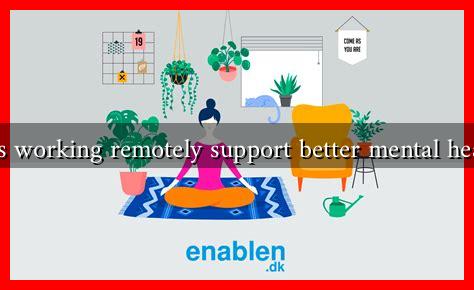-
Table of Contents
Does Working Remotely Support Better Mental Health?
The rise of remote work has transformed the traditional workplace, especially in the wake of the COVID-19 pandemic. As companies and employees adapt to this new normal, a pressing question arises: does working remotely support better mental health? This article explores the relationship between remote work and mental well-being, examining both the benefits and challenges associated with this work model.
The Benefits of Remote Work on Mental Health
Remote work offers several advantages that can positively impact mental health. Here are some key benefits:
- Flexibility: Remote work allows employees to create their own schedules, which can lead to a better work-life balance. This flexibility can reduce stress and increase job satisfaction.
- Reduced Commute: Eliminating the daily commute saves time and energy, allowing employees to allocate that time to self-care, family, or hobbies, which can enhance overall well-being.
- Personalized Work Environment: Working from home enables individuals to create a workspace that suits their preferences, which can lead to increased comfort and productivity.
- Increased Autonomy: Remote work often comes with greater autonomy, allowing employees to take ownership of their tasks and responsibilities, which can boost self-esteem and motivation.
According to a study by Buffer, 32% of remote workers cite flexibility as the biggest benefit of working from home, which directly correlates with improved mental health outcomes.
Case Studies Highlighting Positive Outcomes
Several organizations have reported positive mental health outcomes as a result of remote work policies. For instance:
- GitLab: This all-remote company emphasizes mental health support through regular check-ins and mental health days. Employees report feeling less stressed and more engaged in their work.
- Zapier: With a fully remote workforce, Zapier provides resources for mental health, including access to therapy and wellness programs. Employees have noted a significant reduction in anxiety levels since transitioning to remote work.
These case studies illustrate how companies can foster a supportive environment that prioritizes mental health in a remote setting.
The Challenges of Remote Work on Mental Health
While remote work has its advantages, it also presents challenges that can negatively impact mental health:
- Isolation: Remote workers may experience feelings of loneliness and isolation, which can lead to depression and anxiety. The lack of social interaction can be detrimental to mental well-being.
- Work-Life Boundaries: The blurring of lines between work and personal life can lead to burnout. Without a clear separation, employees may find it difficult to disconnect from work.
- Communication Barriers: Remote work can hinder effective communication, leading to misunderstandings and feelings of disconnection from the team.
A survey by the American Psychological Association found that 61% of remote workers reported feeling more isolated than when they worked in an office, highlighting the importance of addressing these challenges.
Strategies for Supporting Mental Health in Remote Work
To maximize the mental health benefits of remote work while mitigating its challenges, both employers and employees can implement several strategies:
- Regular Check-Ins: Managers should schedule regular one-on-one meetings to discuss workload, mental health, and any concerns employees may have.
- Encourage Social Interaction: Virtual team-building activities and informal catch-ups can help combat feelings of isolation.
- Set Clear Boundaries: Employees should establish a designated workspace and set specific work hours to maintain a healthy work-life balance.
- Provide Mental Health Resources: Employers should offer access to mental health resources, such as counseling services and wellness programs.
Conclusion
In conclusion, working remotely can support better mental health by providing flexibility, reducing commute stress, and increasing autonomy. However, it also presents challenges such as isolation and blurred work-life boundaries. By implementing effective strategies, both employers and employees can create a remote work environment that prioritizes mental well-being. As we continue to navigate the evolving landscape of work, understanding the impact of remote work on mental health will be crucial for fostering a healthier workforce.
For more insights on mental health in the workplace, you can visit the American Psychological Association.


